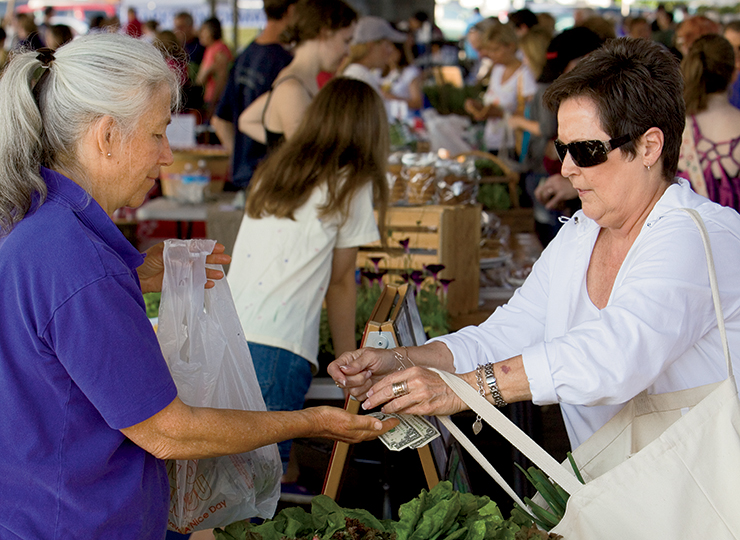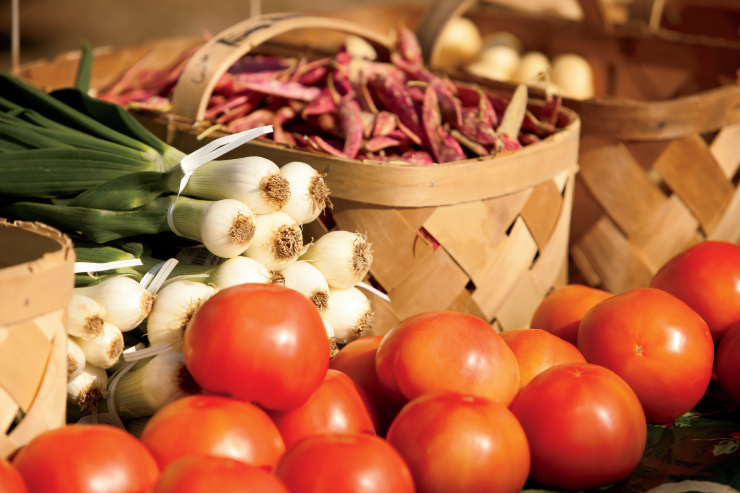Home > Tennessee > Tennessee Farm to Table > Making a Market: Behind the Scenes of TN’s Farmers Markets
Making a Market: Behind the Scenes of TN’s Farmers Markets
In partnership with: Tennessee Department of Agriculture

Visit any of Tennessee’s 120 farmers markets across the state, and not only are you sure to get fresh, delicious, local food, but also a rewarding experience.
“Farmers markets are not just a place to buy food – they’re also a destination,” says Pamela Bartholomew, agritourism marketing specialist at the Tennessee Department of Agriculture (TDA). “Most markets have music, theme days and events to get consumers involved.”
That consumer involvement has resulted in significant growth in the amount of Tennessee farmers markets in recent years. “People want to know where their food comes from,” says Bartholomew. “And a farmers market is the best source to find that. I get calls weekly from communities wanting to know how to start a market.”
Farmers markets give consumers the chance to meet local farmers and see the direct source of their food, along with offering a neighborly gathering and adding value to economic growth. Bartholomew says that at some markets, it’s clear that the market is the highlight of the town’s week.
As society changes and technology continues to grow, the state’s markets have started to adapt. Many of the larger markets now have capabilities to take multiple food payments including food stamps and vouchers, allowing everyone to have access to fresh, local food. Farmers are also brushing up on technology, accepting payment from credit and debit cards with iPads.
“This has such a great impact, since it allows more people to get fresh food,” says Bartholomew. “And we all know no one carries cash anymore.”
The Rutherford County farmers market in Middle Tennessee is conducting a study on the impact of the voucher and credit card systems at farmers markets. “This will provide good data and be tremendously helpful to future markets,” Bartholomew says.
One of the state’s most successful markets is the Franklin Farmers Market in historic downtown Franklin. According to Bartholomew, the space has grown tremendously and is great at keeping consumers and vendors happy. The weekly market is open year-round on Saturdays, and open two days in the summer.
An especially unique aspect of the Franklin market is their partnership with local Italian restaurant, Amerigo. They provide them with food from the market and in return, the restaurant features a farmers market five-course meal in the summertime made with local ingredients. They also feature a farm-fresh menu that contains dishes using only farmers market ingredients.

The growth of Tennessee’s farmers markets isn’t slowing down any time soon, and with the accumulation of more vendors, TDA is making a concerted effort to work with markets to make food safe for consumers. TDA Food and Dairy Administrator Bill Walls explains that the process of farmers market regulations depends on the vendors’ products.
“We categorize the products into two categories: potentially hazardous products and non-potentially hazardous products,” Walls says.
A potentially hazardous product is any food that includes ingredients capable of supporting rapid growth of microbial toxins when stored at unsafe temperatures or improperly processed. This includes things like meat products, seafood and home canned foods. For vendors to be able to sell these products at a farmers market, the products must be manufactured in a licensed, inspected facility. Non-potentially hazardous products are just the opposite. They can be produced in a home kitchen and include items such as jams, jellies and baked goods.
However, vendors of these products must display a sign at their booth, letting consumers know it was made in an at-home kitchen that was not inspected. They must also meet certain labeling requirements. Ready-to-eat food such as kettle corn or doughnuts that are made on-site are regulated by the county health department. Walls says that in addition to TDA regulations, farmers markets may have their own specific regulations that they require.
To help vendors meet safety regulations, the TDA established the domestic and commercial kitchen programs for producers. The domestic kitchen program was started in March 2011, and allows vendors to make non-potentially hazardous food items in a home kitchen that is licensed and inspected by TDA. These products can be sold at most venues including farmers markets. Vendors are, however, required to obtain a Domestic Kitchen License and complete a food safety course acceptable to TDA. The University of Tennessee offers an online course on domestic kitchens for those wanting to become licensed and learn more.
“This program is a great way for companies to get started and test the waters before making a major financial investment,” says Walls.
Commercial kitchens are used for potentially hazardous products like salsa, canned foods and cream-filled pastries. A commercial kitchen must have an on-site manager and certified equipment that is used to safely produce the product. Based on the risk of the product, the TDA inspects the actual process of making the food one to two times per year. Ingredients are also checked for an approved source, packaging is approved, labeling is checked, and lot and batch numbers are recorded in case of a recall.
Walls says that in 2013, the TDA is working to make changes to keep food safe for consumers.
“We are starting a farmers market focus group. The group will include processors, vendors and growers that will meet routinely to discuss safety rules, proposed rules and other issues.” he says. “By spring, vendors will be able to view food regulations online, categorized by product, and UT will be offering an online better processing certification course.”
Consumers wanting to learn more about Tennessee’s farmers markets and find a market close to them can visit www.PickTNProducts.org.



